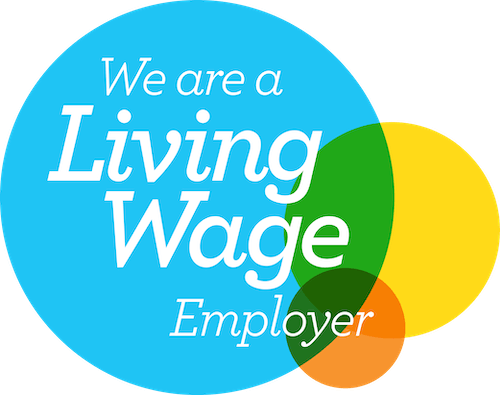Ah, website copy. It’s a careful balance of creative and psychological, pin-point accuracy and storytelling. And blogging! It builds trust with your audience and helps you get found on Google. All very important.
But what if writing is just not your thing? When lovely small business owners like you can’t, or don’t want to, sit and wrestle with words, they turn to professional copywriters like me.
I know what you’re thinking: how the heck does it all work?
Don’t worry, I’ve got you. I’m a copywriter for indie and sustainable brands and I’ve been writing for over 10 years in some form or another. Website copy, blogs, product descriptions, newsletters, just about anything a business needs, I’ve written it.
I’m obsessed with helping business owners communicate who they are and what they do, so they sound irresistible to their customers.
I’ve also created content for Studio Cotton’s lovely clients Stitching Me Softly and The Leather Store which is why I’ve been invited to write this guest blog.
Now, without further ado, here are 5 expert tips for outsourcing the words on your website to an expert- from finding a good professional copywriter, to getting exactly what you want.
1. How to find a professional copywriter
Ok, this can seem a little overwhelming to start with, but there are a bunch of ways to find a professional copywriter.
First off, speak to your network of small biz pals. Have any of them worked with a copywriter? Were they any good? If someone you know and trust can vouch for a copywriter’s work there’s less likely to be any shenanigans. (Meaning: missed deadlines, dodgy spelling, promising the moon and delivering a Babybel.)

If there are no personal recommendations to be had, start browsing. Head to your favourite search engine, type in ‘copywriter’ and a differentiator which you care about. Location, type of business, a value which is important to you… whatever you fancy.
You know how it works. When you find a website which you like the look of, don’t focus on the design or the images, but instead zero- in on the words themselves. Do they make you feel something? Are you compelled to act? This is a sign of effective website copy.
Pro tip: Keep track of the websites you loved, and those you didn’t. You can give these examples to your copywriter as examples of what you like and don’t like.
Another way to find a professional copywriter is to go to procopywriters.com, where the most fabulous freelance copywriters gather. You can read profiles of copywriters according to their location or experience and see which ones you connect with. It’s kinda like online dating but there’s no swiping or lies about enjoying long country walks.
Last but not least- social media. Finding a professional copywriter, or any freelancer, on social media can work well- some of my most favourite clients found me on Instagram- but it’s a crowded space, and it’s easy for some people to look like an expert when they’re… not. Use social media as the starting point, but don’t invest in anyone without doing your research.
2. How do you know if a professional copywriter is good?
Once you’ve found some freelance copywriters, there are some green flags to look for.
It’s time to get snoopy.
Their testimonials will give you an insight into their clients, and their portfolio will give you an insight into their ability. Carefully read their social media captions, their blogs, and the emails they write to you. You should find consistently accurate sentences, and an authentic tone of voice at the very least.
Importantly- when you speak to a copywriter, you should feel comfortable asking them questions. They should be able to give you straight answers, and never rush you towards a decision. It should feel like meeting a colleague: professional, positive, and productive.
What a professional copywriter is charging will also give you an indication about how good they are.
Someone offering to write a 1000-word blog for £50 is not the bargain you might think it is. It takes hours to write in detail, with totally original content, research, editing, keywords, and proof-reading. If a writer is charging peanuts, they will absolutely be cutting corners somewhere.

They could be:
- Duplicating content (plagiarism is gross and bad for SEO)
- Using AI software (which is clunky at best, and unreadable at worst)
- Outsourcing to people in developing countries and paying literal pennies for hours of work
The whole thing is icky whichever way you look at it.
As a guide, Procopywriters does a survey each year to find out the average day rate of UK copywriters. In 2021 it was £390 per day. There are some which are cheaper, and some which charge even more.
Communicating your budget to your copywriter is a good idea. You can also discuss a payment plan or ask their advice on how to break down a project in to smaller, more affordable sections.
3. Clear copywriting brief, clear outcomes
Once you’re ready to invest your money (and time!) working with a professional copywriter, of course you want to get the best result. The number one way to do this it to give them a clear brief.
A brief explains what you want to be written, when you want it, and what you want it to do.
There’s a huge difference between “I need website copy”, and “I need website copy to explain who I am and what I do”, or “I need website copy to describe my products”. The success of a project is built on the foundations of a strong, clear brief.
But what if you don’t know what you want?
If you haven’t nailed down your goals, tone of voice, brand values, or overall brand concept, you might need a brand strategy session first.
It is only when your copywriter knows exactly what you want that they can create it for you.

Pro tip: any copywriter who promises specific outcomes, like getting you more followers, or 50% increase in website visitors, or a first- page ranking on Google is shady. There’s no way for one person to guarantee any of that. They’re telling you what they think you want to hear, and you should avoid them.
4. How to give a copywriter constructive feedback
Edits and revisions are an important part of any project. It’s all about how you word your feedback to get the best results. Keep it clear, specific, and, perhaps most importantly, kind.
Let’s say your copywriter has written a few sentences about your product or service which aren’t working for you.
This is an unhelpful way to word your feedback:
“Don’t like this bit. Something’s not working here. It’s a bit flat maybe. Perhaps it needs to have more info?”
From a copywriter’s perspective, there’s no clear way to implement this feedback. It’s all guesswork- “something… maybe… perhaps”. It’s also a bit mean! “Don’t like it… flat”. Remember, a person has created something for you, and being overly critical, or being unconstructive, is a sure-fire way to ruin a professional relationship.
Helpful feedback looks something like:
“I love the phasing here, it feels like something I’d say, and you’ve captured my brand voice. However, this next part isn’t correct it needs to be XXX. I’d love the whole section to have even more energy/ excitement.”
Your copywriter now knows what you like and why. They know what the correction needs to be. And, they know they can be a bit bolder with the tone of voice. All of this is actionable, and your second draft is going to be exactly what you want it to be.
Any good professional copywriter is used to getting feedback and writing revisions.
They aren’t going to be offended by you wanting to change something. Just be specific, clear, and kind.
5. Trust in your professional copywriter’s expertise
This might sound obvious, but you’d be surprised how often a client can unintentionally sabotage great copy.
If a professional copywriter has researched, written, edited, revised, and proofread your copy… don’t change it.
Not the structure, not the vocab, not the call to action. Nothing.
By the time the final draft is done and sent to you, it has been agonised over. It has been tweaked and changed and perfected until every word is in the right place.
There will be symmetry in bullet points. There will be a precisely placed rhetorical question. There will be sentences carefully crafted with keywords. There will be the exact adjective to describe the product/service while keeping your tone of voice. There will be stringently accurate punctuation. The headlines will have had 10, 12, 15 different versions. It’s why you paid a professional.
So, don’t be tempted to “put your spin on it” when you put it on your website. I mean, you can, it’s yours, you have all the rights to do what you want with it, but you might just ruin something without even realising you’ve ruined it.
Your input and ideas are so, so important. Your copywriter wants to hear them, but at the brief stage and after the first draft when you give (clear and kind) feedback.
There you go! Five tips for outsourcing your website copy to a professional. In summary: do your research, be clear, and be kind. (Oh, and if you pay your copywriter’s invoice early and write them a lovely testimonial, they’ll love you forever and ever and ever.)
Happy outsourcing!
Bonnie Harrington is a Bristol-based copywriter and content writer for proper lush sustainable indie brands.























